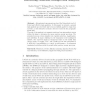Free Online Productivity Tools
i2Speak
i2Symbol
i2OCR
iTex2Img
iWeb2Print
iWeb2Shot
i2Type
iPdf2Split
iPdf2Merge
i2Bopomofo
i2Arabic
i2Style
i2Image
i2PDF
iLatex2Rtf
Sci2ools
PKDD
2015
Springer
2015
Springer
Discovering Neutrinos Through Data Analytics
Abstract. Astrophysical experiments produce Big Data which need efficient and e↵ective data analytics. In this paper we present a general data analysis process which has been successfully applied to data from IceCube, a cubic kilometer neutrino detector located at the geographic South Pole. The goal of the analysis is to separate neutrinos from atmospheric muons within the data to determine the muon neutrino energy spectrum. The presented process covers straight cuts, variable selection, classification, and unfolding. A major challenge in the separation is the unbalanced dataset. The expected signal to background ratio in the initial data (trigger level) is roughly 1:106 . The overall process was embedded in a multi-fold cross-validation to control its performance. A subsequent regularized unfolding yields the sought after neutrino energy spectrum.
Data Mining | PKDD 2015 |
Related Content
| Added | 16 Apr 2016 |
| Updated | 16 Apr 2016 |
| Type | Journal |
| Year | 2015 |
| Where | PKDD |
| Authors | Mathis Börner, Wolfgang Rhode, Tim Ruhe, Katharina Morik |
Comments (0)

